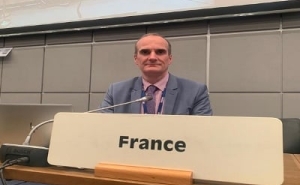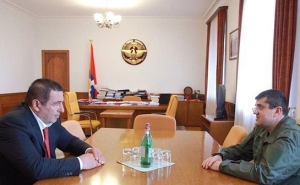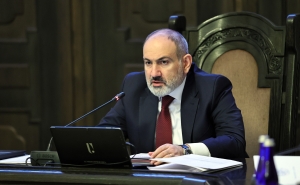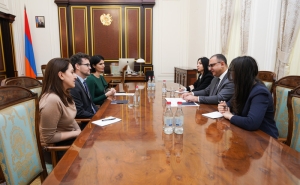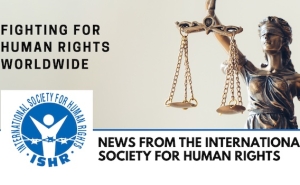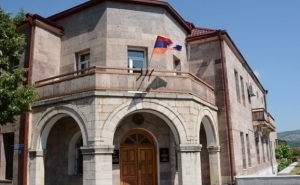Artsakh Foreign Minister about Karabakh Conflict Settlement and about Preparing Peoples for Peace (EXCLUSIVE)
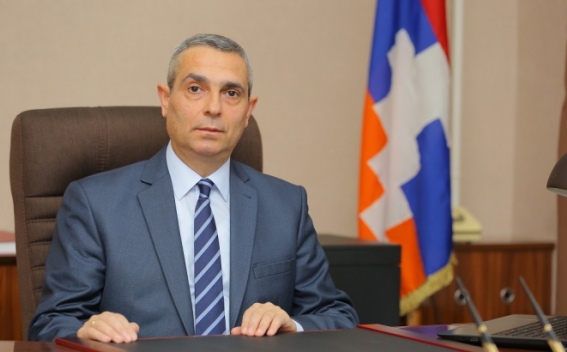
"Armedia" IAA presents an exclusive interview with Masis Mayilyan, Minister of Foreign Affairs of Artsakh Republic.
- Mr. Mayilian, 2019 marks 31 years since the beginning of the Karabakh Movement. Today, de facto Artsakh has solved the problem that caused the Movement. De jure, there is a frozen regional conflict, a centre of interest for many international players. Do you think the Armenian parties used the time properly to bring the world community closer to recognition of the Nagorno Karabakh Republic?
- I think that during these three decades more time, resources and attention were devoted to addressing the central issue of ensuring the physical security of Artsakh, as well as of the Republic of Armenia, which was justified. At first, there were periods when the Armenian parties had some expectations from the negotiation process, and therefore the main efforts were directed at achieving an early settlement of the Azerbaijan-Karabakh conflict.
I believe that the trilateral negotiation process with the full participation of the Artsakh delegation and the process of international recognition of the Republic of Artsakh should proceed in parallel.
The steps we are taking for the international recognition of Artsakh will not only soften the uncompromising negotiating positions of Azerbaijan, but will also contribute to enhancing Artsakh’s security and ensuring regional stability. I should note that the international recognition of the Republic of Artsakh and the peaceful settlement of the Azerbaijan-Karabakh interstate conflict are priorities of our foreign policy agenda, which are reflected in the Program of President Bako Sahakyan for 2017-2020. The settlement, in turn, must be based on recognition of the implementation of the Artsakh people's right to self-determination.
The successes of Artsakh in state building, strengthening of democratic institutions and addressing economic and social issues opened up new opportunities in the process of international recognition of the republic. Moreover, Artsakh has passed the test of time and demonstrated that it is an effective state that implements a responsible foreign policy aimed at ensuring peace and security in the region. It is necessary to give new impetus to the positive trends that have emerged in this area in recent years, and bring the process of international recognition of Artsakh to its logical conclusion. I would like to point out that Nikol Pashinyan also spoke about the need to redouble efforts for the international recognition of Artsakh during his speech at the National Assembly of Armenia in May last year.
- The OSCE Minsk Group Co-Chairs started talking about preparing the peoples for peace, about the economic potential of co-operation, etc. Has Artsakh taken any steps in this direction?
- The authorities of Artsakh have always encouraged projects to support confidence-building, as well as cross-border co-operation in the humanitarian and economic spheres. Some twenty years ago, the Ministry of Foreign Affairs of Artsakh developed and submitted to the Azerbaijani side through mediators a list of confidence-building measures. Regrettably, our proposals, including mutually beneficial project ideas of a humanitarian nature, were rejected by official Baku. Artsakh and the Republic of Armenia also admitted the possibility of establishing economic co-operation with Azerbaijan before the signing of a peace treaty.
As for the preparation of societies for peace, it should be noted that Azerbaijan is so far behind Artsakh and Armenia in this matter that making any comparisons is inappropriate. In order to move further in preparing societies for peace, Azerbaijan must first make up the gap created by official Baku. Over the years, the state policy on promoting xenophobia, encouraging hate crimes against Armenians, the glorification of criminals who committed such crimes, torpedoing public peace initiatives, ceaseless propaganda threatening war and the isolation of Artsakh are just some examples of the counterproductive policies of the regime.
Such actions by Azerbaijan, which often did not receive proper assessment by the mediators, have created and continue to create an extremely negative background for the whole process of the Azerbaijan-Karabakh conflict settlement. Therefore, at the first stage, the Azerbaijani authorities should stop the hate campaign and with international prodding, take effective steps to eradicate the negative phenomena that have begun to take root in Azerbaijani society as a result of many years of disseminating intolerance towards Armenians.
- How would you characterize the current stage of negotiations on Karabakh? Do you see any reason for concern?
- The informal meetings of the leaders of Armenia and Azerbaijan, as well as consultations at the level of foreign ministers of the two countries cannot be considered negotiations. On the other hand, any meetings that contribute to strengthening peace and security in the region can only be welcomed.
It should also be noted that effective communication has been established between Stepanakert and Yerevan, including at the level of foreign ministries - regular meetings and consultations are held at various levels. It allows us to bring to the attention of our colleagues in Yerevan the position of Stepanakert on certain key issues of the negotiation processes. At this stage, I see no reason for concern, especially - for its public expression.
- Mr. Minister, you stated that after the recent change of power in Armenia the position of the Republic of Armenia on the Azerbaijan-Karabakh conflict settlement has become more clear, in particular, on the need to restore the full-fledged trilateral format of negotiations. In your opinion, is it possible to expect an expansion of the format in the near future and, in general, what does the Karabakh negotiation process lack today?
- The potential to restore the full-fledged trilateral format is available. Some work is being done in this direction. Clearly, restoring the negotiation format with the direct and full participation of Artsakh at all stages of settlement is crucial for advancing the peace process and ensuring its effectiveness.
The process of peaceful settlement of the Azerbaijan-Karabakh conflict lacks, first of all, political will on the part of the Azerbaijani authorities. The issue of Artsakh’s participation in the negotiations is the most accurate indicator of the degree of real progress, and not the declared willingness of Azerbaijan to search for a peaceful solution.
- Any long-standing conflict requires fresh ideas. Does Artsakh have any fresh ideas for the negotiation process?
The Azerbaijan-Karabakh conflict is not new. It has lasted for more than a hundred years. The conflict emerged from the moment Azerbaijan appeared on the political map of the world and that conflict went through different phases. Even though it is considered one of the most difficult to solve, the mediators proposed various ideas for its settlement, especially over the past 30 years, but so far to no avail. In general, negotiation is an art, and it does not do without creative ideas. The authorities of Artsakh do have fresh approaches, but we would prefer to voice them at the negotiating table.
We have repeatedly stressed the need for revising some outdated approaches in the settlement process and expressed readiness to contribute to the development of new, more realistic ideas that would allow everyone to achieve lasting peace in the region.
Other materials on this subject
- Russian forces have clearly failed in their duties: senators press Biden Administration to break Azerbaijan’s blockade The United States cannot stand aside while the Aliyev regime callously threatens the lives of Nagorno-Karabakh’s citizens, and must hold Azerbaijan to account for blocking a civilian population’s access...
- US calls for the full restoration of free movement through the Lachin Corridor "We remain concerned about impeded access to the Lachin Corridor and the humanitarian implications of this situation. This sets back the peace process and undermines international confidence. We call for...
- Azerbaijani forces violate the ceasefire in Artsakh The ceasefire violation was reported to the command of the Russian peacekeeping troops.
- Azerbaijani units violate ceasefire in several directions, Artsakh’s Defense Ministry says The Armenian side has no losses. The incidents of ceasefire violations were reported to the command of the Russian peacekeeping troops.
- Russian Diplomat Reassures Armenians Over Corridor In Karabakh "The parties are in direct contact, and I assure you that the peacekeepers will not move a single centimeter until there is a new corridor," Seleznyov said.
-
 17:08
17:08The regular session of the Anti-corruption Policy Council takes place in Jermuk
-
 15:05
15:05The Prime Minister sends congratulatory messages to the supreme leader of Iran and the President of Iran
-
 11:11
11:11Armenia sends earthquake aid to Turkey
-
 10:43
10:43Commemoration of the Pontiff St. Sahak Partev
-
 09:16
09:16Some roads are closed and difficult to pass in Armenia
-
 19:55
19:55Phone conversation of the Foreign Minister of Armenia with the U.S. Assistant Secretary of State for European and Eurasian Affairs
-
 18:30
18:30Prime Minister Pashinyan and President Khachaturyan meet
-
 18:20
18:20Ararat Mirzoyan with Co-Chairman of the OSCE Minsk Group of France Brice Roquefeuil
-
 17:01
17:01Humans could land on Mars within 10 years, Musk predicts
-
 16:45
16:45France, US urge 'immediate' end to Nagorno Karabakh blockade
-
 16:01
16:01Blockaded Nagorno Karabakh launches fundraiser to support quake-hit Syria
-
 15:59
15:59Earthquake death toll in Turkey rises to 18,342
-
 15:43
15:43Ararat Mirzoyan Held a Telephone Conversation with Sergey Lavrov
-
 15:06
15:06French president rules out fighter jet supplies to Ukraine in near future
-
 14:47
14:475 Day Weather Forecast in Armenia
-
 14:44
14:44President Vahagn Khachaturyan wrote a note in the book of condolences opened in the Embassy of Syria in Armenia
-
 14:20
14:20Azerbaijan’s provocations impede establishment of peace and stability – Armenian FM tells Russian Co-Chair of OSCE MG
-
 12:57
12:57France representation to OSCE: Paris calls on Azerbaijan to restore freedom of movement through Lachin corridor
-
 11:40
11:40Command of Kosovo forces highly appreciated preparation of Armenian peacekeepers
-
 10:16
10:16The United States withdrew from sanctions against Syria for six months the provision of assistance after the earthquake
day
week
month
Humidity: 25%
Wind: 1.03 km/h


